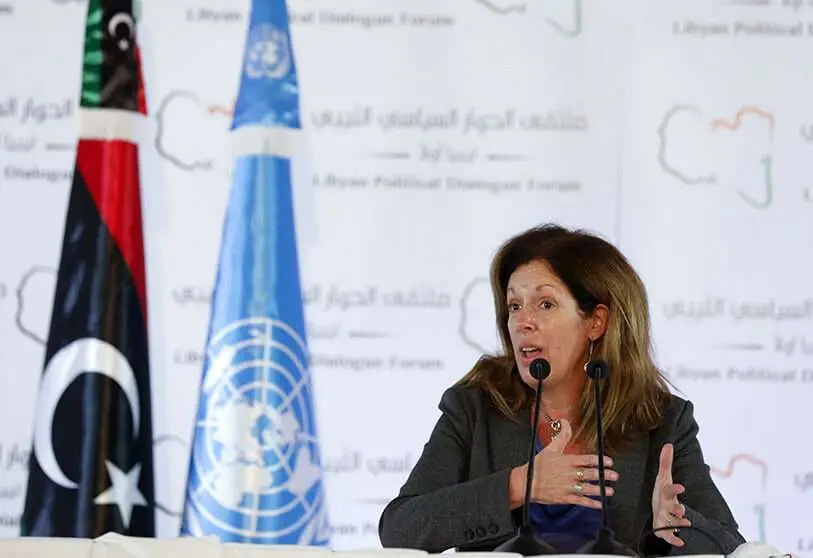Turkey does not engage fully with UN envoy for Libya

Stephanie Williams, the United Nations (UN) special envoy for Libya, visited Turkey to discuss the current situation in the North African country and was not received by the Ottoman country's top diplomatic representative, its foreign minister Mevlut Cavusoglu.
The US diplomat met only with lower-ranking officials from the Turkish Foreign Ministry, which implies a lack of involvement at the highest level on the part of the Eurasian country in the issue of resolving the conflict and establishing a mechanism for holding Libyan elections, as the media outlet Al-Arab pointed out, referring to the point of view of various analysts and specialists. Thus, the UN envoy's first interlocutor was the Turkish deputy foreign minister, rather than the ministerial portfolio holder Mevlut Cavusoglu.
Turkey gave the UN advisor a cool reception, which is understood by many analysts as a refusal to discuss the issue of the withdrawal of foreign forces from Libya in order to be able to carry out the longed-for elections and complete the democratic process in the North African country.
According to experts, Stephanie Williams did not receive the necessary attention during her visit to Turkey to explore ways to reach a political solution in Libya, which observers interpret as a Turkish message that they do not want dialogue on Libya with a lower-ranking representative of US diplomacy, such as Stephanie Williams. Perhaps it could be interpreted that Turkey would only bring in its foreign minister if the US secretary of state himself, Antony Blinken, arrived to speak.
"Had very productive discussions in Ankara with Turkish Deputy Foreign Minister Sedat Unal and Special Envoy Ambassador Can Dizdar," Williams said via Twitter. "We exchanged views on political developments in Libya, the electoral process and the way forward," she added. "We also stressed the need to strengthen the spirit of consensus among Libyan parties for the common good of the country," Stephanie Williams said.
On the other hand, Turkish Defence Minister Hulusi Akar has already confirmed that "Turkish army forces will remain in Libya and will not leave", as reported by Al-Arab.

In the face of Stephanie Williams' position of strengthening the process aimed at holding an electoral process in Libya, Turkey is delaying the issue by not discussing at the highest level the relevant issue of the withdrawal of foreign troops, which is one of the conditions demanded by the UN and the international community in order to settle the Libyan conflict.
In this way, the problem in Libya remains entrenched after the decision to postpone until a date to be determined the electoral process that was scheduled for 24 December. The postponement of the presidential and legislative elections in Libya put an end to the optimism that existed in the North African country. These elections were part of the national reconciliation plan promoted by the UN, completed the political transition and served to promote the establishment of peace and stability in Libya. But the various obstacles encountered by the Libyan Supreme Electoral Commission caused the planned elections to be postponed until a new date. Imad al-Sayeh, chairman of the Electoral Commission, said in a report to the House of Representatives in Tobruk.

Libya remains in a difficult situation after more than ten years of civil war that has pitted the Tripoli-based Government of National Accord led by Prime Minister Fayez al-Sarraj, supported by Turkey, Qatar and Italy, against the Libyan National Army of Marshal Khalifa Haftar, which was associated with the other eastern government in Tobruk and supported by countries such as Saudi Arabia, the United Arab Emirates, Russia and France.
After years of fighting, an agreement was reached to appoint an interim government led by Prime Minister Abdul Hamid Dbeibah. This executive was charged with leading the political transition until the elections on 24 December, which were eventually postponed.

Libya became a theatre of war with the involvement of foreign powers interested in Libya's oil resources and geostrategic position. All this was aggravated by the presence of foreign mercenaries sent by Turkey, with the presence of fighters from the Syrian war and linked to jihadist terrorist groups, as reported by various media, or also sent by Russia, with the presence in this case of soldiers attached to the Wagner Group's private military company, as various reports in the past have pointed out.
According to international reports, at least 20,000 foreign fighters are present in Libya and come from various nationalities such as Syrian, Chadian, Sudanese, Russian and others.








